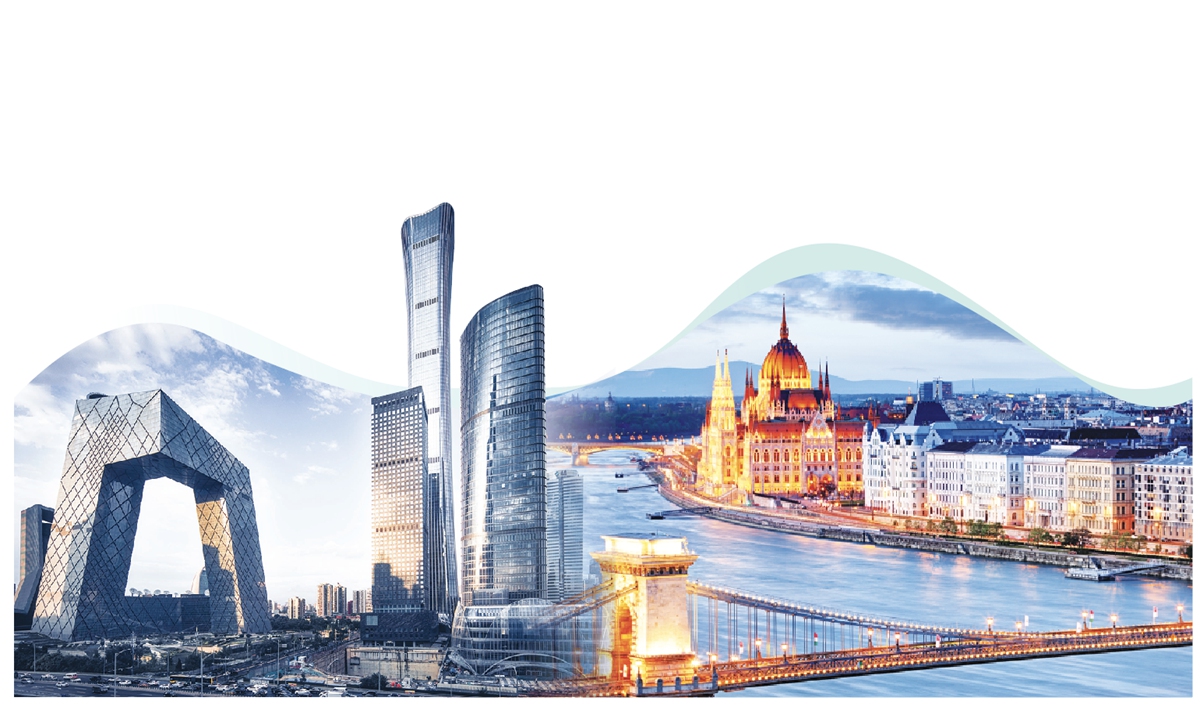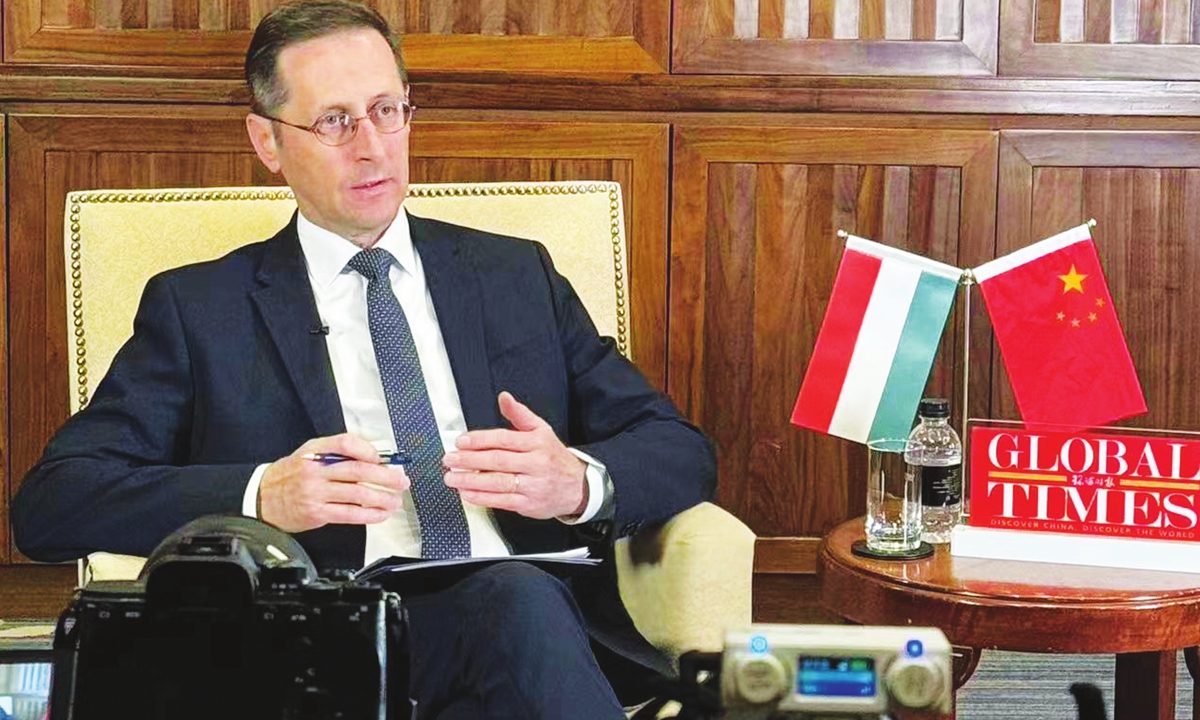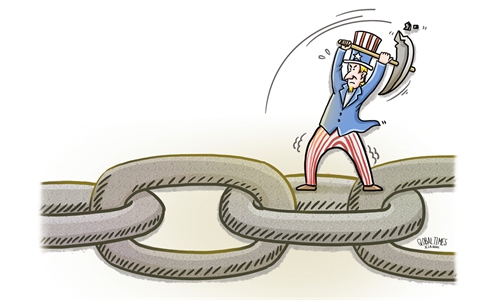Connectivity and cooperation much better than decoupling and derisking: Hungarian finance minister

A view of Beijing (left) and a view of Budapest (right) Photos: VCG
Editor's Note:
Over the past decade, Hungary has established itself as a bridge for economic cooperation between Europe and China. Despite being a member of both the EU and NATO, Hungary has consistently looked to the East. Why did Hungary choose this different route? What role can Chinese companies play in Hungary? Global Times (GT) reporters Wang Wenwen and Fan Wei talked to Hungarian Finance Minister Mihály Varga (Varga), who visited China on April 2 and 3 to strengthen bilateral financial ties.
GT: Although Hungary is a member of both the EU and NATO, its China policy differs significantly from the blocking and isolating approach taken by other Western countries. Why did Hungary choose a different path?
Varga: We are a member country of the European Union, and we are belonging to the Western countries. It's a balance of political harmony. We have the right to represent our own interests and engage in our own communication. We have to find a way which is better for the Hungarian nation and the Hungarian people. That is the aim of the Hungarian government.
The current government of Hungary has always been of the opinion that coupling and networking must replace blocking and isolation in the world. History teaches us that blocking always leads to conflicts, ending in wars. On the other hand, connecting and cooperation always lead to results representing real value. The best example to this is the international cooperation seen in the field of research and development. The technological revolution witnessed today stems directly from this cooperation. Breakthrough results in technology shape the global economy, and partly even transform the geopolitical map of the world. It is my conviction that the right way forward is seeking cooperation. At the very least, it is absurd that researchers in distant countries can achieve technological breakthroughs through cooperation, while politicians from the same countries make use of these results to weaken other countries, hindering their ability to cooperate in science. It is certainly beneficial to mitigate this practice.
Common sense encourages us to shift toward cooperation. After 2010, Hungary broke with its previous foreign policy of exclusively turning toward the West, and launched its Eastern Opening policy. We build connections in all directions, and China is one of our most important partners. Since 2017, China has been a strategic partner of Hungary. Considering that China is currently the second biggest economy in the world, this is a particularly beneficial result. In order to reinforce our economic connections, we are constantly developing financial cooperation between China and Hungary, as well as the related logistics background and facilities. These are the two key areas that enable investment and trade promotion in all other industries. E-mobility and related industries are to be highlighted among all.

Mihály Varga Photo: Niu Yingbo/GT
GT: What is the current status of financial cooperation between China and Hungary today, and in what direction does it develop?
Varga: For a long time now, more Chinese investments arrive in Hungary every year. China was the biggest foreign investor in Hungary in 2022 and 2023. And from the point of view of China, we are the No.1 target country of investments in the region. Trust is mutual, laying the foundations for the future. Economic cooperation and investments require a significant background in terms of financial affairs, cash flow and banking. The process is greatly promoted by the presence of the Bank of China, which has its regional center in Hungary. In 2022, the China Construction Bank and the China Development Bank have also started their operations, and the Industrial and Commercial Bank of China is just about to open its branch office in Budapest. An important element of the agenda of my current visit comprises this financial cooperation. Bond issuances also belong to this domain.
Hungary is committed to combating climate change. As a member state of the European Union, we support the climate neutrality goals for 2050. In order to achieve these goals, we started issuing green bonds in 2020. The aim of such bonds is to finance investments with positive environmental or climate-related effects in a dedicated manner. In December 2021, Hungary was the first in the world to issue foreign sovereign bonds in the Chinese bond market, with its Green Panda bonds of the Hungarian state. In 2022, a second Green Panda Bond issuance followed. In addition, cooperation between our countries is developing through various multilateral financial institutions.
GT: China has become the biggest foreign investor in Hungary. How do you evaluate Hungary's role as a bridgehead in Chinese-European relations?
Varga: Indeed, Hungary intends to become the gateway for Asia to Europe and the European Union. In order to achieve this, we must implement all the necessary transport and freight investments, and build up the necessary logistics and storage capacities. In many fields, we can see advanced conditions today.
In relation to the Belt and Road Initiative launched by China, the modernization of the Budapest-Belgrade rail is in progress through trilateral cooperation between China, Hungary and Serbia. Once this rail starts its operation, Budapest will become the European endpoint of the 21st-century maritime Silk Road. Air freight transport is also undergoing important developments. Logistic centers are established around Budapest and it is an important strategic goal of the government to develop the Budapest Airport in the direction of stronger logistics support capacities.
GT: One of the most important areas of current global economic transformation is e-mobility, which is closely linked to green transition. Many Chinese new e-mobility companies are choosing to build factories in Hungary today. What role can Hungary take within the e-mobility market of Europe, and what role can Chinese companies play in Hungary?
Varga: Automotive industry has always been one of the driving sectors in Hungary, and we are one of the centers of the industry in Europe. So far, we have been an important player in the field of producing combustion engine passenger vehicles. However, the transition toward e-mobility created new opportunities for us. We have a chance to become one of the biggest European winners of this economic change, and Chinese investments play a key role in this.
The most important investments are the ongoing battery factory investment of CATL, and the appearance of EVE Power, Huayou Cobalt and Sunwoda in Hungary. Finally, BYD is just launching a huge investment in Hungary to build its first European automotive factory. These production capacities give us a good chance for Hungary to become an essential and decisive player of e-mobility in the European market.
GT: What do you think of the current concerns about Chinese EV development in Europe?
Varga: I think Chinese EVs are a good competition in the European market. The European car makers, companies and industry have to produce much better cars in this field. Another question, the world is a globalized market. American, Chinese and European companies are in the market. If we want to build better, faster, and cheaper cars in this market, we have to work together. That means the connectivity and cooperation are much better for all companies than the decoupling and derisking mentioned in European policy many times.
GT: In relation to the current conflicts between the West and the East, voices opposing cooperation with China have increased in the past years. Why does Hungary continue its Eastern Opening policy despite this negative international climate of opinions?
Varga: The friendship between China and Hungary has a layer that is beyond economic considerations, as Hungary is linked to Asia also through cultural bonds. Hungarians have a dual identity. We have belonged to the Western, Christian culture for 1,000 years, in fact, as one of the oldest countries of the European continent. However, our eastern roots have always been important to us, and this is also reflected in the way we look at the world and in our Hungarian way of thinking. We can call it a kind of cultural conservatism that is extended in time. Along with the Western culture, our legacy brought from the East is also important. And thus, the openness of Hungarians toward Asia is a living tradition. In the past, this did not bother anyone. While there are opposing voices today, we cannot, and do not want to change our history and past.
In summary, our economic interests, history and cultural bonds, as well as our common sense, all gravitate to believe that the policy of coupling must be continued. We see the future in cooperation, not only for Hungary, but also for Europe. Thus, we remain committed to building relationships.

